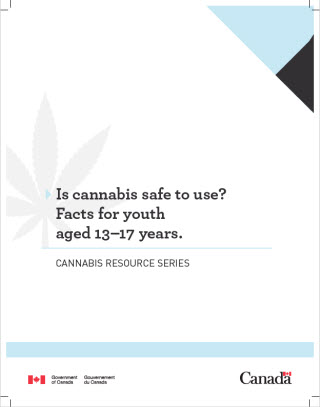Is cannabis safe to use? Facts for youth aged 13–17 years

Download the alternative format
(PDF format, 164 KB, 7 pages)
Organization: Health Canada
Date published: 2018-10-04
Cannabis resource series
On this page:
Key messages for youth—13–17 years
In order to protect youth from the health effects of cannabis use, the Cannabis Act restricts access to cannabis. Therefore, there will be no legal means for a young person to obtain cannabis, and possessing it may result in legal consequences, such as a fine or a ticket.
These are a few key facts that young people should be aware of:
- The best way to protect your health is to not use cannabis.Footnote1
- You are more likely to experience harms from cannabis because your brain is still developing until around the age of 25.Footnote2 The earlier you start using cannabis the more harm it can do Footnote1, Footnote2 Footnote3 For example:
- Starting to use cannabis as a teen and using it regularly (weekly or more frequently) and over a long time (several months or years) make you more likely to become addicted and to harm your mental health Footnote1, Footnote3.
- Using cannabis can affect important aspects of your thinking, like learning and memory Footnote1, Footnote4 Some of these harms may never fully go away. Footnote1,Footnote5,Footnote6,Footnote7
- Studies have found that teens and young adults who start using early and use often have more difficulty studying and are more likely to drop out of high school or university Footnote1, Footnote8, Footnote9, Footnote10, Footnote11, Footnote12, Footnote13, Footnote14
- Higher-strength products (e.g. “skunk”, dabs, waxes, shatter) carry greater risks of harms.Footnote15 , Footnote16 ,Footnote17, Footnote18 , Footnote19, Footnote20
- After alcohol, cannabis is the drug most often linked to car accidents.Footnote21 Cannabis can affect concentration, coordination and slow reaction time. Using it and driving increases the risk of having a car accident which can result in serious injuries or death.Footnote22, Footnote23
- How long the impairing effects of cannabis last depends on how (smoked, vapourized, ingested) and how much was taken, but the effects can last for at least six (6) hours or longer after use. Footnote1 , Footnote24, Footnote25
- Using cannabis at the same time as drinking alcohol and/or using other drugs, such as pain medications (opioids) and tranquilizers (benzodiazepines), further lowers your ability to concentrate and react quickly to emergencies. Footnote21 , Footnote26, Footnote27, Footnote28, Footnote29
- If you need more information or support, talk to your parent/guardian, teacher, coach or other trusted adult.
Supporting information
For: Medical and public health professionals, parents, educators and other adult influencers
What are the other names for cannabis?
Cannabis is also called marijuana, weed, skunk, pot, herb, ganja, grass, Mary Jane, wax, shatter budder, dabs, and reefer.
What do we know about cannabis use in youth?
In Canada, about one in six (1/6) students in grades 7 to 12 (secondary I to V in Quebec) have reported using cannabis in 2014–2015.Footnote30
It is estimated that Canadian adolescents have among the highest rates of cannabis use compared to their peers in other developed countries.Footnote31
Why do youth use cannabis?
Youth use cannabis for a number of reasons:Footnote32
- To improve or intensify mood: “It’s exciting.”
- To be social: “It helps me enjoy a party.”
- To cope with stress: “It helps me forget about my problems.”
- To expand their views: “It helps me understand things differently.”
- To fit in: “So I won’t feel left out.”
- To break with routine: “I use it because I feel bored.”
How does cannabis use affect the health of teens?
Short term effects:
- Impairs concentration and reaction time shortly after use. Cannabis diminishes concentration and attention, impairs coordination and slows reaction time. Footnote23 Using cannabis and driving can result in a car accident and serious injuries or death. Footnote22, Footnote23
- Makes it harder to learn and remember things. Youth may have problems paying attention, remembering or learning things, and making decisions after using cannabis Footnote4.
- Affects mood and feelings. Cannabis can make youth feel very anxious, panicked, sad, and fearful Footnote4.
- Affects mental health. Cannabis can trigger a psychotic episode (not knowing what is real, experiencing paranoia, having disorganized thoughts, and in some cases having hallucinations), Footnote4.
- Worsens mental health effects when higher potency products are used. Using higher-potency cannabis products (such as concentrates like “shatter”, dabs or wax) can worsen the mental health effects of cannabis use (such as paranoia and psychosis), Footnote15, Footnote16, Footnote17, Footnote18, Footnote19, Footnote20.
Longer term effects
i.e. regular use of cannabis (daily or almost daily) over a long time (several months or years):
- Hurts the lungs and makes it hard to breathe. Cannabis smoke contains many of the same harmful substances as tobacco smoke.Footnote33 Also, like smoking cigarettes, smoking cannabis can damage the lungs and result in a cough or wheezing and other breathing symptoms.Footnote34
- Affects mental health. Teens that start using cannabis early, use it regularly and continuously over time (“heavy” users) are more likely to experience anxiety, depression, psychosis, and schizophrenia. Footnote3, Footnote19, Footnote35 Stopping use improves these symptoms.Footnote36, Footnote37
- May lead to addiction. Addiction to cannabis may have major negative impacts on everyday life and affect school, relationships with family and friends, sports, extra- curricular activities and volunteer work, Footnote4.
For more information on the effects of cannabis on youth, you can read the following documents:
- World Health Organization (WHO) (2016). The health and social effects of nonmedical cannabis use.
- Canadian Centre on Substance Abuse (CCSA) (2015). The Effects of Cannabis Use during Adolescence. .
- Canadian Centre on Substance Abuse (CCSA) (2017). Canadian Youth Perceptions on Cannabis. .
Briefs available in this series
Is cannabis safe to use? Facts for young adults aged 18–25 years.
Does cannabis use increase the risk of developing psychosis or schizophrenia?
Is cannabis safe during preconception, pregnancy and breastfeeding?
Is cannabis addictive?